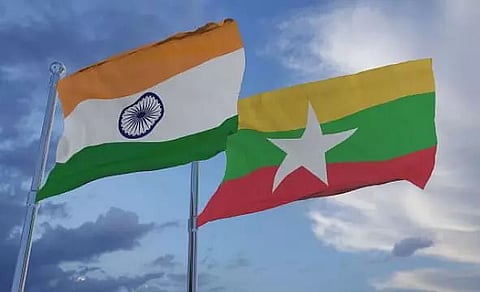
- Home
- Live Blog
- Breaking News
- Top Headlines
- Cities
- NE News
- Sentinel Media
- Sports
- Education
- Jobs

Indian Foreign Secretary Harsh Vardhan Shringla's two-day visit to Myanmar has put the spotlight on the Kaladan Multimodal Transit Transport Project and the Trilateral Highway project that are crucial for connecting the Northeast region to a vibrant ASEAN economy. The return of peace and democracy to Myanmar is critical to expedite these two cross-border connectivity projects. India urging Myanmar to return to democracy at the earliest, release detainees and prisoners is a marked shift from the initial cautious approach of not antagonising the military junta. India's northeast region is at the centre of Act East policy and four states in the region – Arunachal Pradesh, Nagaland, Manipur and Mizoram – share the county's 1700-km-long porous border with Myanmar. Peace along India-Myanmar border regions and political stability in Myanmar, therefore, is vital to the execution of all projects under this foreign policy initiative. Apart from meeting the leaders of the military junta regime Shringla also held meetings with members of civil society and political parties, including the National League for Democracy led by Aung San Suu Kyi whose democratically elected government was ousted in the military coup. India has emphasized that Myanmar should try to resolve the issues through dialogue and there should be a complete cessation of all violence. During his visit, the Foreign Secretary expressed India's continued support for "people-centric socio-economic developmental projects", including those along with the India-Myanmar border areas, as well as India's commitment for expeditious implementation of ongoing connectivity initiatives such as the Kaladan Multimodal Transit Transport Project and the Trilateral Highway. He also reiterated India's commitment to continue with the projects under the Rakhine State Development Programme and Border Area Development Programme for the benefit of the people of Myanmar. Kaladan project is a vital trans-border connectivity project to reduce transport distance between the northeast region with the rest of India through Chin and Rakhine State in Myanmar. A 158-km river channel connects the Sittwe port with Paletwa in Myanmar which will connect with Zorinpui on the Mizoram-Myanmar border with a 110-km road. The project has already been delayed by seven years with originally targeted to be completed by 2014. Armed conflict between Myanmar's ethnic rebel groups and Myanmar Army as well as clashes between various rebel groups have given rise to a hostile situation in the Kaladan project area which is a major factor delaying it. Turmoil in Myanmar is also delaying the 1360-km Trilateral Highway project which is vital for establishing seamless connectivity between India and ASEAN to facilitate trade and movement of people. The project will connect Moreh in Manipur with Mae Sot in Thailand through Myanmar and therefore restoration of peace in Myanmar is the first precondition for its expeditious completion. Bangladesh evincing interest to join the Trilateral highway project demonstrates the importance of the project in the Asian sub-region. Expeditious completion of the highway is also important to Indian deepening engagement with ASEAN as it seeks to extend the highway project to Lao PDR and Cambodia. The Foreign Secretary handing over one million doses of "Made in India" vaccines to the Myanmar Red Cross Society, including doses for communities living along Myanmar's border with India and announcing a grant of 10,000 tonnes of rice and wheat to Myanmar is a good gesture by a close neighbour to help people of Myanmar in troubled times. Both sides reiterated their commitment to ensuring that their respective territories would not be allowed to be used for any activities inimical to the other. As the vast area along the India-Myanmar border is controlled by Myanmar's rebel groups which provide shelter to Indian rebel groups, expecting a quick result from such bilateral commitments will be unrealistic. India has the compulsion of balancing its strategic interest with its support for the restoration of democracy in Myanmar. Despite the Military Junta letting loose a reign of terror on people protesting against military rule that reportedly claimed more than 1300 lives, India taking an extreme position against the military junta regime will only allow China to increase its influence which will be detrimental to India's security. With Myanmar remaining the vital link between India and ASEAN, increasing Chinese influence in the neighbouring country poses the threat of derailing India-ASEAN engagement and shattering the dream of North-eastern states to get connected to a vibrant ASEAN economy. Under the prevailing circumstances, India engaging with all stakeholders in Myanmar is a pragmatic move aimed at balancing the two extremes without losing focus of the strategic interests. As far as expediting Kaladan and Trilateral highway projects are concerned, India remaining engaged with Myanmar, irrespective of the regime, is the only hope. It is hoped that India's push for restoration of democracy in Myanmar will mount pressure on the neighbouring country to take a relook at its internal politics and weigh the risk and benefits of the continuation of a repressive regime. Myanmar must restore democracy in the interest of the people of both the neighbouring countries.